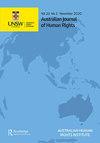A vulnerability approach to irregular migration and modern slavery in Australia
Q1 Arts and Humanities
引用次数: 0
Abstract
ABSTRACT It is widely recognised that migrants and irregular migrants are at risk of modern slavery and slavery-like practices worldwide. As migrants and irregular migrants make their way across state borders, or reach their destination countries, they have been victim to practices such as forced labour, exploitation, wage theft, torture and inhuman treatment and sexual servitude, among other practices. Australia is no exception, with just under 300 cases of modern slavery reported to the Australian Federal Police between 2021 and 2022. Although Australia has acted to stop slavery and slavery-like practices, it has focused on a law enforcement response, ignoring the role that laws and policies play in contributing to modern slavery in Australia. This article adopts a vulnerability approach to modern slavery, examining how legal, policy, institutional and structural factors within Australia contribute to exacerbating the vulnerability of migrants and irregular migrants to modern slavery and slavery-like practices. Utilising a vulnerability framework not only moves beyond the law enforcement approaches taken by the Australian government, but sheds important light on the need for policy, legal and institutional reform to effectively combat modern slavery in Australia and ensure there is redress and justice for its victims.澳大利亚应对非正常移民和现代奴隶制的脆弱性方法
摘要人们普遍认为,移民和非正常移民面临着现代奴隶制和类似奴隶制做法的风险。当移民和非正常移民跨越国界或到达目的地国时,他们成为强迫劳动、剥削、工资盗窃、酷刑和不人道待遇以及性奴役等做法的受害者。澳大利亚也不例外,2021年至2022年间,向澳大利亚联邦警察局报告的现代奴隶制案件不到300起。尽管澳大利亚已经采取行动制止奴隶制和类似奴隶制的做法,但它专注于执法回应,忽视了法律和政策在助长澳大利亚现代奴隶制方面所发挥的作用。本文对现代奴隶制采取了一种脆弱性的方法,研究了澳大利亚国内的法律、政策、制度和结构因素如何加剧移民和非正常移民对现代奴隶制和类似奴隶制做法的脆弱性。利用脆弱性框架不仅超越了澳大利亚政府采取的执法方法,而且重要地阐明了政策、法律和体制改革的必要性,以有效打击澳大利亚的现代奴隶制,并确保受害者得到补偿和正义。
本文章由计算机程序翻译,如有差异,请以英文原文为准。
求助全文
约1分钟内获得全文
求助全文
来源期刊

Australian Journal of Human Rights
Arts and Humanities-History
CiteScore
1.30
自引率
0.00%
发文量
43
期刊介绍:
The Australian Journal of Human Rights (AJHR) is Australia’s first peer reviewed journal devoted exclusively to human rights development in Australia, the Asia-Pacific region and internationally. The journal aims to raise awareness of human rights issues in Australia and the Asia-Pacific region by providing a forum for scholarship and discussion. The AJHR examines legal aspects of human rights, along with associated philosophical, historical, economic and political considerations, across a range of issues, including aboriginal ownership of land, racial discrimination and vilification, human rights in the criminal justice system, children’s rights, homelessness, immigration, asylum and detention, corporate accountability, disability standards and free speech.
 求助内容:
求助内容: 应助结果提醒方式:
应助结果提醒方式:


